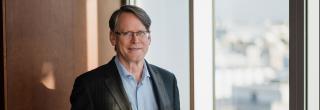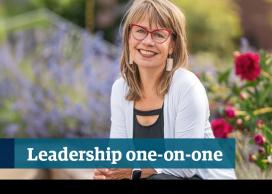Robert Helsley is Dean of UBC Sauder School of Business and Grosvenor Professor of Cities, Business Economics and Public Policy. He joined UBC Sauder as Dean in 2012.
Dean Helsley began his career at UBC, and previously served as Senior Associate Dean, Faculty and Research, Director of the UBC Centre for Real Estate and Urban Economics and Chair of the Urban Land Economics division, all within UBC Sauder.
Between 2008 and 2012, before returning to UBC, he served at the Haas School of Business at the University of California, Berkeley as a Professor and Chair in Real Estate Development, and was the Co-chair of the Fisher Center for Real Estate and Urban Economics.
Q1. What quality do you most admire in a leader?
RH: One of my favourite qualities in a leader is generosity. Leadership is about service to others, making other people feel supported and positive about the work they do.
Q2. What makes you laugh?
RH: My favorite comedian is Robin Williams. I also find humour in irony, and sometimes the political stage. Although I do have to say it’s sometimes a case of ‘laugh or cry’.
Q3. Who inspires you, and why?
RH: My nephew, Michael. He and I were relatively close in age, but Michael sadly passed away a year ago. For years he had to manage ill health, yet outwardly he showed no indication of what he was going through. He was inspirational in how he managed adversity, and he was incredibly courageous.
Q4. For you, what makes UBC different?
RH: The culture and the people. I feel that UBC has a collaborative culture, and is able to embrace a wide variety of perspectives. Our diversity is truly one of our assets. I believe it makes UBC very distinctive, in that we can all experience and contribute to dialogue that supports respect for others.
Q5. What is the most important lesson you’ve learned, in your career to date?
RH: Every organization needs to have a purpose. It needs to connect in a meaningful way to a set of overarching objectives and themes. UBC Sauder has recently gone through a strategic planning process and it really highlighted how important this link to a higher purpose can be. Our vision is to build a more just, sustainable and prosperous world through innovation and responsible leadership. These are the sorts of aspirations that make it easy to come to work.
Q6. How do you like to recharge?
RH: I like to spend time with my family and I play the guitar. I have a bit of a collection, including one that I keep in the office. I play mostly jazz and blues. For me, playing the guitar is a wonderful way to relax.
Q7. What is the best advice you were ever given?
RH: Late in his life, singer-songwriter Warren Zevon was asked (on The Late Show with David Letterman) what advice he would pass on to others, and he said: “Enjoy every sandwich”. That has stayed with me — it reminds me to seize the day, as life is short.
Q8. What do you value in your colleagues?
RH: Intelligence, humility and kindness.
Q9. What would you like your time as Dean to be known for?
RH: I hope it would be around emphasizing the role of values in business, and helping to spotlight the potential of business to affect positive change. At UBC Sauder, we want to train responsible leaders for the future, to have them leave our programs with a strong sense of social responsibility.
Q10. What role does UBC Sauder play within the university as a whole?
RH: We have spent a lot of time considering how UBC Sauder can benefit the broader university, and we see ourselves as a facilitator of careers. We try to connect with the other Faculties in a meaningful way to provide business training, to help students improve their career prospects. An example of this would be a student who studies both music and business, so they graduate with a combination of skills. There are many wonderful students like this in the new Bachelors’ plus Masters of Management dual degree program.
Another way that UBC Sauder contributes to the broader university is around entrepreneurship education. UBC now has many interesting programs in this area, including as e @ UBC, HATCH and the Creative Destruction Lab West. It is exciting to see companies grow out of these initiatives.
Q11. With the recent launch of the school’s strategic plan, where do you see the opportunities for UBC Sauder, in the next few years?
RH: The process of creating a strategic plan for UBC Sauder has been enlightening in so many ways. I believe it is the first time that we’ve established our vision and values. And we have been able to identify clear links with the broader UBC Strategic Plan: Shaping UBC’s Next Century.
In terms of our core principles, we have articulated our ambitions under the themes of research excellence, transformative student experience, collaborative and respectful environment, proud and engaged alumni and community partners, and global reputation for excellence in innovation and social impact.
There is power in articulating our values and ambitions, and it allows us to clearly come back to the question of how business can serve the public interest. There is an exciting road ahead.
Published: February 1, 2019
Interviewed by: Kate Hunter, UBC Internal Communications



